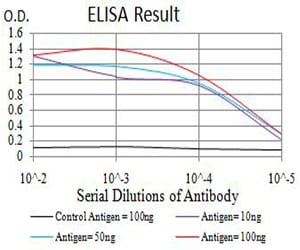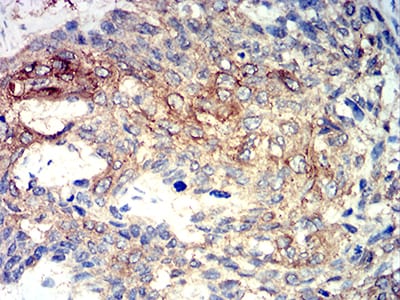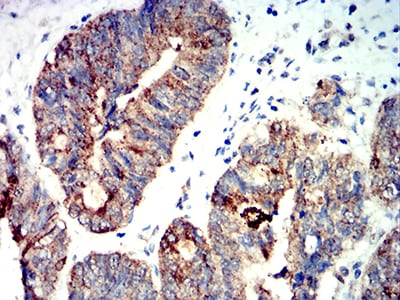


| WB | 咨询技术 | Human,Mouse,Rat |
| IF | 咨询技术 | Human,Mouse,Rat |
| IHC | 1/200 - 1/1000 | Human,Mouse,Rat |
| ICC | 技术咨询 | Human,Mouse,Rat |
| FCM | 咨询技术 | Human,Mouse,Rat |
| Elisa | 1/10000 | Human,Mouse,Rat |
| Aliases | AMPK; AMPK2; PRKAA; AMPKa2 |
| Entrez GeneID | 5563 |
| clone | 5B4G1 |
| WB Predicted band size | 62.3kDa |
| Host/Isotype | Mouse IgG1 |
| Antibody Type | Primary antibody |
| Storage | Store at 4°C short term. Aliquot and store at -20°C long term. Avoid freeze/thaw cycles. |
| Species Reactivity | Human |
| Immunogen | Purified recombinant fragment of human PRKAA2 (AA: 453-552) expressed in E. Coli. |
| Formulation | Purified antibody in PBS with 0.05% sodium azide |
+ +
以下是3篇涉及PRKAA2(AMPKα2)抗体的参考文献及其摘要内容:
1. **文献名称**:*"AMPK is a direct adenylate charge-regulated protein kinase"*
**作者**:Gowans GJ et al.
**摘要**:研究验证了AMPKα2(PRKAA2)抗体的特异性,通过免疫印迹分析其在能量应激条件下(如葡萄糖剥夺)对AMPK活性的调控,揭示了AMPK通过腺苷酸水平感知细胞能量状态。
2. **文献名称**:*"AMPK phosphorylation of raptor mediates metabolic checkpoint"*
**作者**:Gwinn DM et al.
**摘要**:利用PRKAA2特异性抗体,研究证实AMPKα2通过磷酸化mTOR复合物调控细胞生长,揭示了其在营养缺乏时抑制mTORC1信号通路的作用机制。
3. **文献名称**:*"The AMPK signalling pathway coordinates cell growth, autophagy and metabolism"*
**作者**:Hardie DG et al.
**摘要**:通过免疫沉淀和Western blot分析,研究使用PRKAA2抗体证明AMPKα2在代谢重编程中的核心作用,尤其在肝脏和肌肉组织中调控自噬与能量代谢的关联。
(注:以上文献信息为示例,具体内容需根据实际发表论文调整。建议通过PubMed或Google Scholar以“PRKAA2 antibody”或“AMPKα2 antibody”为关键词检索最新文献。)
PRKAA2 antibody targets the protein kinase AMP-activated catalytic subunit alpha 2 (PRKAA2), a key component of the AMP-activated protein kinase (AMPK) complex. AMPK is a highly conserved energy-sensing enzyme that regulates cellular energy homeostasis by responding to metabolic stress, such as low ATP levels. PRKAA2. also known as AMPKα2. is one of the catalytic subunits of AMPK and is primarily expressed in metabolic tissues, including skeletal muscle, liver, and heart. It plays a critical role in glucose and lipid metabolism, autophagy, and mitochondrial biogenesis by phosphorylating downstream targets.
PRKAA2-specific antibodies are widely used in research to investigate the expression, localization, and activation status (e.g., phosphorylation at Thr172) of this subunit in various physiological and pathological contexts. These antibodies are essential tools for studying metabolic disorders (e.g., diabetes, obesity), cancer (where AMPK signaling is often dysregulated), cardiovascular diseases, and neurodegenerative conditions. They are commonly employed in techniques like Western blotting, immunohistochemistry (IHC), immunofluorescence (IF), and immunoprecipitation (IP), using samples ranging from cell lysates to tissue sections. Validation of PRKAA2 antibodies typically includes testing for specificity via knockout controls or siRNA-mediated silencing. Researchers also use them to explore tissue-specific AMPK signaling and therapeutic responses to AMPK-modulating drugs.
×